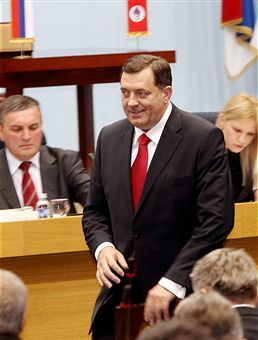 Bosnia has been getting more attention recently, as analysts predict gridlock (or worse)
in the coming weeks. The reason is a move by the country’s Bosnian Serb leader, Milorad Dodik, to challenge parts of the Dayton Peace Agreement, which ended the hard-fought war in 1995.
Bosnia has been getting more attention recently, as analysts predict gridlock (or worse)
in the coming weeks. The reason is a move by the country’s Bosnian Serb leader, Milorad Dodik, to challenge parts of the Dayton Peace Agreement, which ended the hard-fought war in 1995.
Few people outside Bosnia know who Dodik is. Those who knew him during the Bosnian War or immediately afterwards saw him as a moderate businessman-turned-politician.
But since then, Dodik has either changed or shed his cover. Now he wants to hold a vote next month on whether to reject Bosnia’s federal institutions, especially the war crimes court. He has accused the court of bias.
A Berlusconi-style attack on the court is probably related to ongoing investigations into his business dealings. But his complaint is also inspired by nationalist sentiment: he hopes to make Republika Srpska, the Bosnian Serb part of Bosnia he rules, as independent as possible from the Bosnian state.
A drive towards actual independence is expected, but may take decades to materialise. In the meantime, Dodik wants to destabilise the country, hoping that the international community will run out of the patience needed to hold Bosnia together. He is helped by bickering in the Croat-Muslim part of the country.
Some think his actions will lead to violence; others that it will simply make the state dysfunctional. Either way, his actions will increase ethnic tensions, retard economic progress and sentence to Bosnians of all faiths and ethnicities to live in corruption and poverty.
The international community seems at a loss of what to do. The International Crisis Group insists that the forthcoming Bosnian Serb referendum should take place, claiming (incorrectly) that it cannot be stopped. Of course it can. Ballots can be seized if the act is illegal or is seen as risking war. That is why a peacekeeping force still patrols Bosnia. But whether it makes political sense to do so is another matter. And is that what the international community wants to be doing more than fifteen years after the Dayton Agreement was signed?
The Bosnian Serb leader is certainly banking on international apathy and confusion. With the Libya intervention, unrest in Syria and fragility in Egypt, the West is understandably distracted. But it cannot afford to let the country slide into the abyss, which could affect countries such as Croatia, Montenegro and Serbia. The UK must lead the international community in a tough stance vis-à-vis the Bosnian Serb leader.






Comments